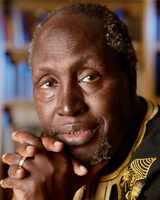
Listen
Two generations of African writers—Ngũgĩ wa Thiong’o, an elder statesman from Kenya, and Richard Ali A Mutu, a young novelist from the Democratic Republic of the Congo—discuss the politics of writing in African languages, the vibrancy of the continent’s cultural output, and exciting new trends in East, West, and Central African writing. Thiong’o and Mutu will be joined for a rare look at groundbreaking indigenous voices by David Shook, the founding editor of Phoneme Media and publisher of Mutu’s debut novel, Mr. Fix-It, the first novel written in Lingala to be translated into English.
Ngũgĩ wa Thiong’o is a world-renowned Kenyan writer, scholar, and social activist. Ngũgĩ’s diverse body of work includes novels, short stories, plays, articles, essays, and poems, which have been translated into over 60 languages. A Distinguished Professor of Comparative Literature at UC Irvine, he has received numerous awards and 11 honorary doctorates. Ngũgĩ refers to himself as a “language warrior” because of his fight for the recognition of his native Gĩkũyũ and other marginalized languages.
Richard Ali A Mutu was born in Mbandaka, Democratic Republic of the Congo, in 1988. He won the Mark Twain Award in 2009 and published his first novel, Tabu’s Nightmares, written in French, in 2011. His novel Mr. Fix-It, the first novel written in Lingala to be translated into English, appeared from Phoneme Media in 2017. Ali was the only writer working in indigenous languages for the Africa 39 anthology, which showcased the continent’s most talented writers under forty, including Chimamanda Adichie and Dinaw Mengetsu. He works as a lawyer and writer in Kinshasa and hosts a weekly television program about Congolese literature.
